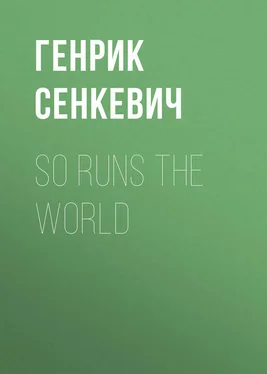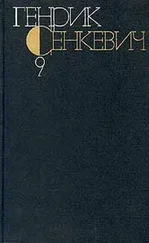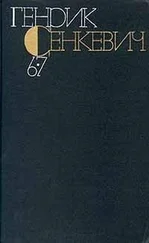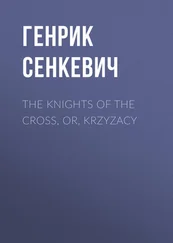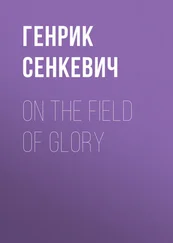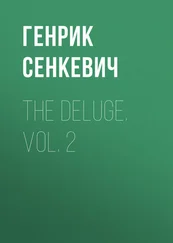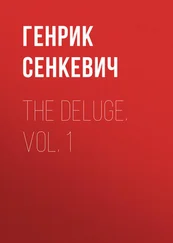Генрик Сенкевич - So Runs the World
Здесь есть возможность читать онлайн «Генрик Сенкевич - So Runs the World» — ознакомительный отрывок электронной книги совершенно бесплатно, а после прочтения отрывка купить полную версию. В некоторых случаях можно слушать аудио, скачать через торрент в формате fb2 и присутствует краткое содержание. Жанр: foreign_antique, foreign_prose, на английском языке. Описание произведения, (предисловие) а так же отзывы посетителей доступны на портале библиотеки ЛибКат.
- Название:So Runs the World
- Автор:
- Жанр:
- Год:неизвестен
- ISBN:нет данных
- Рейтинг книги:5 / 5. Голосов: 1
-
Избранное:Добавить в избранное
- Отзывы:
-
Ваша оценка:
- 100
- 1
- 2
- 3
- 4
- 5
So Runs the World: краткое содержание, описание и аннотация
Предлагаем к чтению аннотацию, описание, краткое содержание или предисловие (зависит от того, что написал сам автор книги «So Runs the World»). Если вы не нашли необходимую информацию о книге — напишите в комментариях, мы постараемся отыскать её.
So Runs the World — читать онлайн ознакомительный отрывок
Ниже представлен текст книги, разбитый по страницам. Система сохранения места последней прочитанной страницы, позволяет с удобством читать онлайн бесплатно книгу «So Runs the World», без необходимости каждый раз заново искать на чём Вы остановились. Поставьте закладку, и сможете в любой момент перейти на страницу, на которой закончили чтение.
Интервал:
Закладка:
Sienkiewicz searching always and continually for a tranquil harbor from the storms of conscience and investigation of the tormented mind, finds such a harbor in the religious sentiments, in lively Christian faith. This idea is woven as golden thread in a silk brocade, not only in "Quo Vadis," but also in all his novels. In "Fire and Sword" his principal hero is an outlaw; but all his crimes, not only against society, but also against nature, are redeemed by faith, and as a consequence of it afterward by good deeds. In the "Children of the Soul," he takes one of his principal characters upon one of seven Roman hills, and having displayed before him in the most eloquent way the might of the old Rome, the might as it never existed before and perhaps never will exist again, he says: "And from all that nothing is left only crosses! crosses! crosses!" It seems to us that in "Quo Vadis" Sienkiewicz strained all his forces to reproduce from one side all the power, all riches, all refinement, all corruption of the Roman civilization in order to get a better contrast with the great advantages of the cry of the living faith: Pro Christo! In that cry the asphyxiated not only in old times but in our days also find refreshment; the tormented by doubt, peace. From that cry flows hope, and naturally people prefer those from whom the blessing comes to those who curse and doom them.
Sienkiewicz considers the Christian faith as the principal and even the only help which humanity needs to bear cheerfully the burden and struggle of every-day life. Equally his personal experience as well as his studies made him worship Christ. He is not one of those who say that religion is good for the people at large. He does not admit such a shade of contempt in a question touching so near the human heart. He knows that every one is a man in the presence of sorrow and the conundrum of fate, contradiction of justice, tearing of death, and uneasiness of hope. He believes that the only way to cross the precipice is the flight with the wings of faith, the precipice made between the submission to general and absolute laws and the confidence in the infinite goodness of the Father.
The time passes and carries with it people and doctrines and systems. Many authors left as the heritage to civilization rows of books, and in those books scepticism, indifference, doubt, lack of precision and decision.
But the last symptoms in the literature show us that the Stoicism is not sufficient for our generation, not satisfied with Marcus Aurelius's gospel, which was not sufficient even to that brilliant Sienkiewicz's Roman arbiter elegantiarum , the over-refined patrician Petronius. A nation which desired to live, and does not wish either to perish in the desert or be drowned in the mud, needs such a great help which only religion gives. The history is not only magister vitae , but also it is the master of conscience.
Literature has in Sienkiewicz a great poet – epical as well as lyrical.
I shall not mourn, although I appreciate the justified complaint about objectivity in belles lettres. But now there is no question what poetry will be; there is the question whether it will be, and I believe that society, being tired with Zola's realism and its caricature, not with the picturesqueness of Loti, but with catalogues of painter's colors; not with the depth of Ibsen, but the oddness of his imitators – it seems to me that society will hate the poetry which discusses and philosophizes, wishes to paint but does not feel, makes archeology but does not give impressions, and that people will turn to the poetry as it was in the beginning, what is in its deepest essence, to the flight of single words, to the interior melody, to the song – the art of sounds being the greatest art. I believe that if in the future the poetry will find listeners, they will repeat to the poets the words of Paul Verlaine, whom by too summary judgment they count among incomprehensible originals:
" De la musique encore et toujours ."
And nobody need be afraid, from a social point of view, for Sienkiewicz's objectivity. It is a manly lyricism as well as epic, made deep by the knowledge of the life, sustained by thinking, until now perhaps unconscious of itself, the poetry of a writer who walked many roads, studied many things, knew much bitterness, ridiculed many triflings, and then he perceived that a man like himself has only one aim: above human affairs "to spin the love, as the silkworm spins its web."
S.C. DE SOISSONS.
"THE UNIVERSITY," CAMBRIDGE, MASS.
PART SECOND
SO RUNS THE WORLD ZOLA
I have a great respect for every accomplished work. Every time I put on the end of any of my works finis , I feel satisfied; not because the work is done, not on account of future success, but on account of an accomplished deed.
Every book is a deed – bad or good, but at any rate accomplished – and a series of them, written with a special aim, is an accomplished purpose of life; it is a feast during which the workers have the right to receive a wreath, and to sing: "We bring the crop, the crop!"
Evidently the merit depends on the result of the work. The profession of the writer has its thorns about which the reader does not dream. A farmer, bringing the crop to his barn, has this absolute surety, that he brings wheat, rye, barley, or oats which will be useful to the people. An author, writing even with the best of faith, may have moments of doubt, whether instead of bread he did not give poison, whether his work is not a great mistake or a great misdeed, whether it has brought profit to humanity, or whether, were it not better for the people and himself, had he not written anything, nothing accomplished.
Such doubts are foes to human peace, but at the same time they are a filter, which does not pass any dirt. It is bad when there are too many of them, it is bad when too few; in the first case the ability for deeds disappears, in the second, the conscience. Hence the eternal, as humanity, need of exterior regulator.
But the French writers always had more originality and independence than others, and that regulator, which elsewhere was religion, long since ceased to exist for them. There were some exceptions, however. Balzac used to affirm that his aim was to serve religion and monarchy. But even the works of those who confessed such principles were not in harmony with themselves. One can say that it pleased the authors to understand their activity in that way, but the reading masses could understand it and often understood it as a negation of religious and ethical principles.
In the last epoch, however, such misunderstanding became impossible, because the authors began to write, either in the name of their personal convictions, directly opposite to social principles and ties, or with objective analysis, which, in its action of life, marks the good and the evil as manifestations equally necessary and equally justified. France – and through France the rest of Europe – was overflowed with a deluge of books, written with such lightheartedness, so absolute and with such daring, not counting on any responsibility toward people, that even those who received them without any scruples began to be overcome with astonishment. It seemed that every author forced himself to go further than they expected him to. In that way they succeeded in being called daring thinkers and original artists. The boldness in touching certain subjects, and the way of interpreting them, seemed to be the best quality of the writer. To that was joined bad faith, or unconscious deceiving of himself and others. Analysis! They analyzed in the name of truth, which apparently must and has the right to be said, everything, but especially the evil, dirt, human corruption. They did not notice that this pseudo-analysis ceases to be an objective analysis, and becomes a sickish liking for rotten things coming from two causes: in the first place from the corruption of the taste, then from greater facility of producing striking effects.
Читать дальшеИнтервал:
Закладка:
Похожие книги на «So Runs the World»
Представляем Вашему вниманию похожие книги на «So Runs the World» списком для выбора. Мы отобрали схожую по названию и смыслу литературу в надежде предоставить читателям больше вариантов отыскать новые, интересные, ещё непрочитанные произведения.
Обсуждение, отзывы о книге «So Runs the World» и просто собственные мнения читателей. Оставьте ваши комментарии, напишите, что Вы думаете о произведении, его смысле или главных героях. Укажите что конкретно понравилось, а что нет, и почему Вы так считаете.
